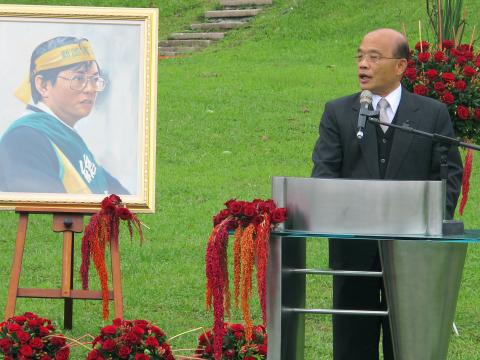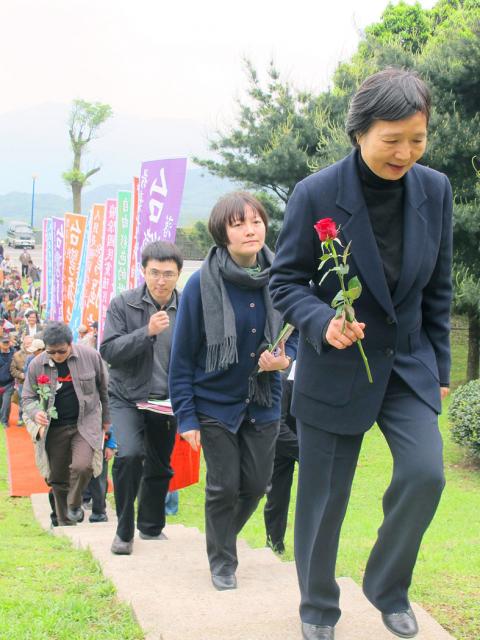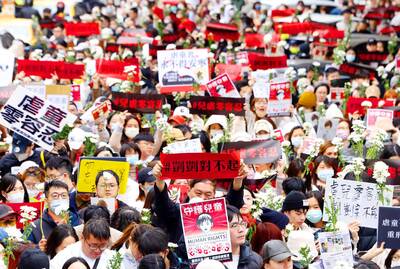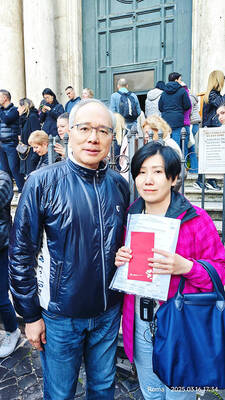Democratic Progressive Party (DPP) Chairman Su Tseng-chang (蘇貞昌) yesterday said that freedom in Taiwan has regressed since “a repressive government” had returned to power.
Su made the remarks at a ceremony in honor of Deng Nan-jung (鄭南榕), the late democracy advocate who set himself on fire 24 years ago and died in defense of “100 percent freedom of expression.”
The event took place at Deng’s tomb in New Taipei City’s (新北市) Jinbaoshan Cemetery in the morning.

Photo: Yu Chao-fu, Taipei Times
Su said it was a hard journey for Taiwanese to win the right of freedom of speech and it was made possible by people like Deng, who sacrificed himself.
Saying that 24 years ago there was no freedom in Taiwan under the then-authoritarian Chinese Nationalist Party (KMT) government, Su said people who had suffered from political repression or harassment knew that “certain words are said at home, not outside, or you could disappear or be caught anytime.”
However, Deng did not keep his mouth closed due to fear or threats, instead he spoke out, Su said.

Photo: Yu Chao-fu, Taipei Times
Deng spoke out not only with his mouth, but also by publishing his writings, he said.
He added that although Deng’s magazine Freedom Era Weekly (自由時代週刊) was banned, and permission for publishing the weekly was suspended again and again, he reapplied repeatedly and never gave up his intention in pursue democracy and freedom for the country.
Deng requested the authoritarian government to lift martial law, mark Feb. 28 an official memorial day for the 228 Massacre, and asked for a total freedom of expression, Su said.
He added that the KMT’s seizure, investigation, detention and imprisonment of Deng was intended to challenge his determination.
However, the KMT did not succeed, and it charged him with treason.
“Twenty-four years later, as we enjoy democracy and freedom of expression, we should not forget Deng’s spirit and the difficult road we have traveled,” Su said.
“After we have democracy, people voted for the then-authoritarian governors and allowed them to retain their power,” Su said.
Now they used more delicate and sophisticated ways to oppress freedom and democracy, Su said.
Freedom in Taiwan has been regressing since the KMT returned to power in 2008, and the US-based Freedom House has also said that freedom of the press in Taiwan has regressed, Su said.
Government propaganda is brainwashing people by saying that everything in China is good, while everything Taiwanese is bad, Su said.
Dealing with the situation, “people should appreciate what we own and learn to make right judgements,” Su added.
Born in Taiwan in 1947 to a family from China, Deng on numerous occasions in the 1980s overtly articulated his support for Taiwanese independence, at a time when a charge of sedition was in place to indict proponents of independence.
He established Freedom Era Weekly in 1984.
On April 7, 1989, he set himself on fire as heavily armed police attempted to break into his Taipei office, where he had barracaded himself for 71 days after he was charged with sedition for his magazine’s anti-government stance and for publishing a draft “Republic of Taiwan constitution” in 1988.

Taiwan yesterday condemned the recent increase in Chinese coast guard-escorted fishing vessels operating illegally in waters around the Pratas Islands (Dongsha Islands, 東沙群島) in the South China Sea. Unusually large groupings of Chinese fishing vessels began to appear around the islands on Feb. 15, when at least six motherships and 29 smaller boats were sighted, the Coast Guard Administration (CGA) said in a news release. While CGA vessels were dispatched to expel the Chinese boats, Chinese coast guard ships trespassed into Taiwan’s restricted waters and unsuccessfully attempted to interfere, the CGA said. Due to the provocation, the CGA initiated an operation to increase

A crowd of over 200 people gathered outside the Taipei District Court as two sisters indicted for abusing a 1-year-old boy to death attended a preliminary hearing in the case yesterday afternoon. The crowd held up signs and chanted slogans calling for aggravated penalties in child abuse cases and asking for no bail and “capital punishment.” They also held white flowers in memory of the boy, nicknamed Kai Kai (剴剴), who was allegedly tortured to death by the sisters in December 2023. The boy died four months after being placed in full-time foster care with the

A Taiwanese woman on Sunday was injured by a small piece of masonry that fell from the dome of St Peter’s Basilica in the Vatican during a visit to the church. The tourist, identified as Hsu Yun-chen (許芸禎), was struck on the forehead while she and her tour group were near Michelangelo’s sculpture Pieta. Hsu was rushed to a hospital, the group’s guide to the church, Fu Jing, said yesterday. Hsu was found not to have serious injuries and was able to continue her tour as scheduled, Fu added. Mathew Lee (李世明), Taiwan’s recently retired ambassador to the Holy See, said he met

The Shanlan Express (山嵐號), or “Mountain Mist Express,” is scheduled to launch on April 19 as part of the centennial celebration of the inauguration of the Taitung Line. The tourism express train was renovated from the Taiwan Railway Corp’s EMU500 commuter trains. It has four carriages and a seating capacity of 60 passengers. Lion Travel is arranging railway tours for the express service. Several news outlets were invited to experience the pilot tour on the new express train service, which is to operate between Hualien Railway Station and Chihshang (池上) Railway Station in Taitung County. It would also be the first tourism service